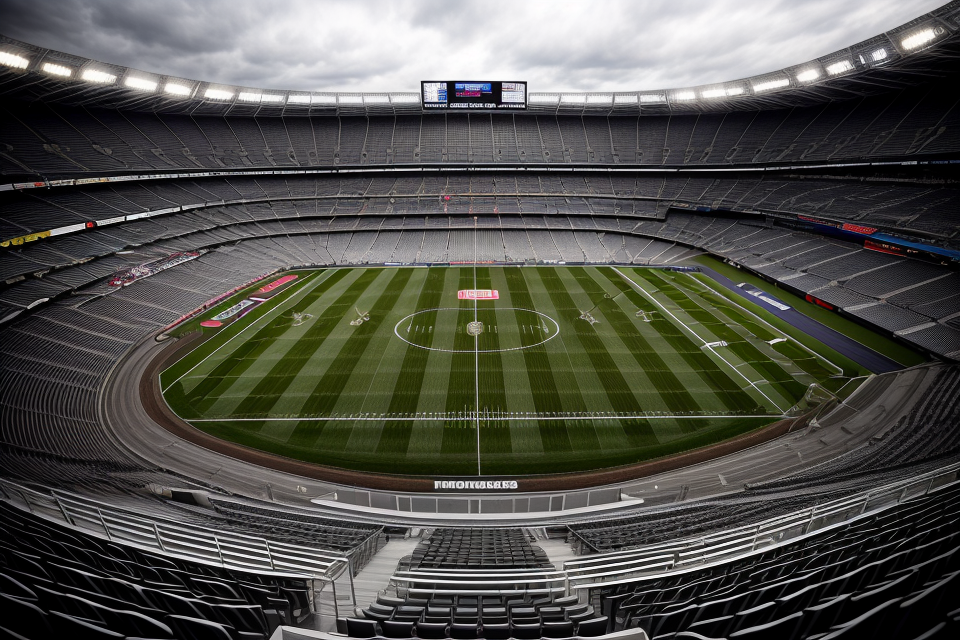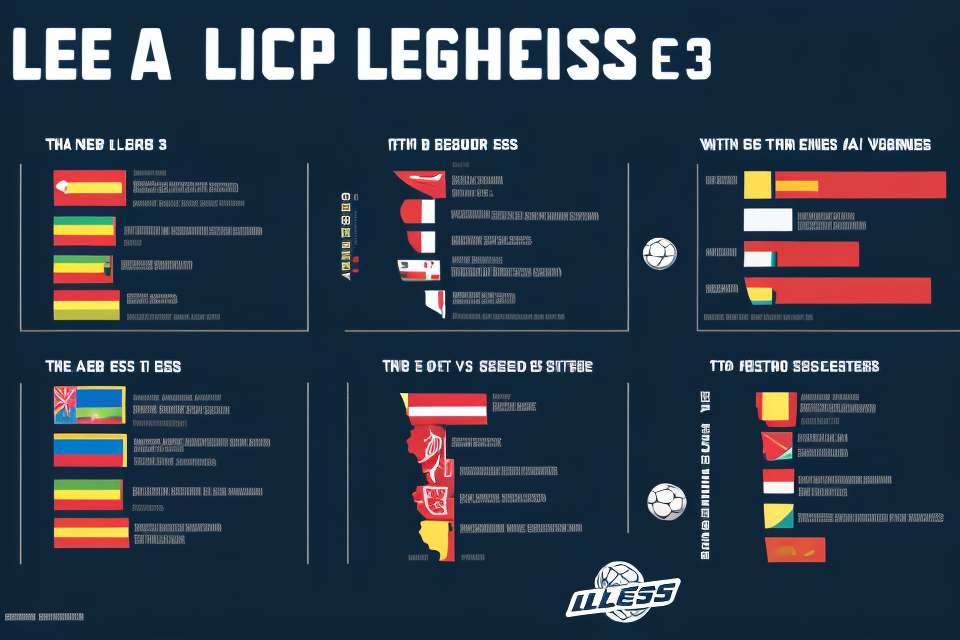The European Super League was a proposed breakaway football league that aimed to replace the UEFA Champions League, but it faced a massive backlash from fans, players, and even governing bodies. Despite the massive resources and support from some of the biggest clubs in Europe, the Super League failed to take off. In this article, we will delve into the reasons behind the failure of the European Super League and examine the implications for the future of football. From the lack of consultation with stakeholders to the ethical concerns surrounding the league, we will explore all the factors that contributed to the downfall of the Super League.
The Origins of the European Super League
Inception and Vision
Overview of the Concept
The idea of a European Super League was first proposed in the late 1990s by a group of wealthy businessmen and football executives. The concept was to create a new competition that would feature the top teams from Europe’s biggest leagues, with the aim of increasing the revenue and exposure of the participating clubs.
Goals and Objectives
The primary goal of the European Super League was to create a more financially lucrative and competitive tournament than the existing UEFA Champions League. The founders of the Super League hoped to attract the world’s best players and increase the revenue for the participating clubs by creating a more exclusive and elite competition.
Key Stakeholders
The key stakeholders in the creation of the European Super League were the wealthy businessmen and football executives who initiated the idea. These included Florentino Pérez, the president of Real Madrid, and Milan Mandarić, the owner of Portsmouth Football Club. Additionally, the major European football clubs, such as Manchester United, Liverpool, and AC Milan, were also significant stakeholders in the formation of the Super League.
The Football Pyramid and European Competitions
Impact on domestic leagues
The introduction of the European Super League was met with significant backlash from fans, clubs, and leagues across the world. One of the main concerns was the potential impact on domestic leagues. Many argued that the creation of a new, elite competition would draw the best teams away from their domestic leagues, reducing the quality of play and diminishing the importance of domestic competitions. This would have had a profound effect on the existing leagues, potentially leading to a loss of revenue and a decrease in the popularity of the sport.
Effects on existing competitions
The European Super League was also seen as a direct threat to existing competitions such as the UEFA Champions League. The Champions League is considered to be the pinnacle of club football in Europe, and the introduction of a new competition would have potentially diminished its importance. This would have had a significant impact on the footballing landscape, as the Champions League is a crucial part of the sport’s global appeal.
Historical context
The idea of a European Super League has been around for many years, with various proposals being put forward over the years. However, it was not until 2021 that the competition was officially announced, sparking widespread controversy and outrage. The history of the proposal, and the various attempts to bring it to fruition, played a significant role in the eventual failure of the European Super League.
Factors Contributing to the Collapse of the Super League
Lack of Buy-In from Key Stakeholders
The European Super League was doomed from the start due to a lack of buy-in from key stakeholders, including club owners and investors, fans and supporters, and player unions. The absence of support from these groups played a crucial role in the collapse of the proposed league.
Club Owners and Investors
One of the primary reasons for the lack of buy-in from club owners and investors was the perceived lack of financial gain. Many owners and investors felt that the European Super League would not provide sufficient financial benefits to justify the departure from the traditional football pyramid. Furthermore, some club owners and investors were concerned about the potential impact on their domestic leagues and the implications for their fan bases.
Fans and Supporters
Fans and supporters were another crucial group that did not support the European Super League. The proposed league was met with widespread criticism from fans who felt that it threatened the integrity of domestic leagues and the traditional football pyramid. Fans were also concerned about the potential exclusion of their teams from domestic competitions, which could have resulted in a loss of pride and tradition.
Player Unions
Player unions were also opposed to the European Super League, primarily due to concerns about player welfare and the potential impact on domestic leagues. The proposed league was perceived as a threat to the existing football structure, and players were worried about the potential negative consequences for their careers and the game as a whole.
In conclusion, the lack of buy-in from key stakeholders, including club owners and investors, fans and supporters, and player unions, was a significant factor in the collapse of the European Super League. The absence of support from these groups highlighted the difficulties in implementing radical changes to the existing football structure and demonstrated the importance of maintaining a balance between financial gain and tradition in the sport.
Legal Challenges and Threats
UEFA’s Stance
The collapse of the European Super League was primarily due to the vehement opposition from the Union of European Football Associations (UEFA). UEFA, as the governing body of football in Europe, has always sought to maintain the integrity of the game and promote fair competition. The proposed Super League, on the other hand, was seen as a direct challenge to this, as it would have allowed a select few clubs to bypass the traditional qualification routes and secure a place in the competition based on their financial muscle alone. UEFA was quick to voice its disapproval of the proposal, threatening to ban any clubs that participated in the breakaway league from all its competitions, including the prestigious Champions League.
National Football Associations
The national football associations, representing the various countries where the Super League clubs were based, also threatened to ban the participating clubs from their domestic leagues. The English Football Association (FA), for instance, warned that it would not hesitate to take “appropriate action” if any English clubs went ahead with the proposed breakaway league. Similar statements were made by other national associations, indicating that they were prepared to use their regulatory powers to prevent their clubs from joining the Super League.
Potential Legal Ramifications
The potential legal ramifications of the Super League were also a significant factor in its collapse. The breakaway league was seen as a violation of the rules and regulations governing football competitions in Europe, and it was feared that it could lead to a legal battle between the participating clubs and the governing bodies. UEFA, in particular, was confident that it had the legal backing to prevent the formation of the Super League, and it was prepared to take the matter to court if necessary.
Furthermore, the formation of the Super League was seen as a violation of the competition laws in several countries, as it was believed to have created an unfair competitive advantage for the participating clubs. The European Commission was also reported to be monitoring the situation closely, and it had indicated that it was prepared to take action if the proposed league violated any of the EU’s competition rules.
In summary, the legal challenges and threats posed by UEFA, national football associations, and potential legal ramifications played a significant role in the collapse of the European Super League. The proposal was seen as a direct challenge to the existing football order, and it was met with widespread opposition from the governing bodies and fans alike. The potential legal battles and violations of competition laws further added to the list of reasons why the Super League failed to materialize.
Public Outcry and Protests
Fan Reactions
The proposed European Super League sparked a significant reaction from football fans worldwide. Fans expressed their discontent with the project, fearing that it would undermine the integrity of the sport and lead to the decline of domestic leagues. The outcry was not limited to a particular country or region, but was widespread, with fans from various clubs expressing their disapproval.
Impact on the Sport’s Image
The Super League project threatened to tarnish the image of football, a sport that is beloved by millions around the world. The perception of the sport as a meritocracy, where hard work and dedication can lead to success, was at risk of being compromised. Fans feared that the creation of a closed-off, elite league would lead to a loss of the sport’s soul and undermine the values that make it so beloved.
Mobilization of Supporters
The public outcry against the Super League was not limited to social media and online forums. Supporters of various clubs organized protests and demonstrations, calling for the abandonment of the project. These protests were not limited to the United Kingdom, where the project was initially proposed, but were held in various cities around the world. The mobilization of supporters was a significant factor in the ultimate failure of the Super League, as it demonstrated the widespread opposition to the project and the willingness of fans to take action to protect the sport they love.
Alternative Solutions and Proposals
Discussion of Potential Alternatives
A plethora of alternatives were proposed in response to the European Super League (ESL) initiative. Some of these alternatives included:
- Reforming the existing European competitions: Many critics and football stakeholders suggested that the ESL could be achieved through a reform of the existing European competitions, such as the UEFA Champions League and UEFA Europa League. This proposal aimed to strengthen the existing tournaments, ensuring greater financial rewards and competitive balance for all clubs participating.
- Club solidarity payments: Another alternative proposed was to enhance the solidarity payments distributed among clubs participating in European competitions. This idea aimed to bridge the financial gap between the top clubs and smaller teams, reducing the need for a breakaway league.
- Increased TV rights revenue: The existing European competitions could potentially generate more revenue through increased TV rights deals. This would allow for greater financial rewards for all clubs involved, diminishing the need for a separate Super League.
Comparing Proposed Solutions
The aforementioned alternatives were compared in terms of their feasibility, impact on football’s existing structure, and potential financial rewards.
- Reforming the existing European competitions: This proposal offered a more structured approach to enhance the existing tournaments, preserving the integrity of European football. It was considered a viable alternative, as it did not involve a complete breakaway from FIFA and UEFA regulations.
- Club solidarity payments: This solution addressed the financial disparities among clubs, providing a more inclusive approach to distributing wealth within the football ecosystem. However, its feasibility depended on the willingness of the wealthier clubs to share their wealth with smaller teams.
- Increased TV rights revenue: This proposal was seen as a more immediate solution, as it involved generating additional revenue through broadcasting deals. Nevertheless, it lacked the long-term benefits of structural changes to the existing competitions.
How They Influenced the Demise of the Super League
The alternative solutions and proposals played a significant role in the demise of the European Super League. By presenting viable alternatives, they provided a basis for negotiations and dialogue between the involved stakeholders. The discussions around these alternatives put pressure on the ESL founders to reconsider their plans, as they faced growing opposition from fans, football associations, and even some of their own clubs. Ultimately, the alternatives offered a way out of the impasse, allowing the involved parties to save face and back down from the Super League initiative.
The Aftermath of the European Super League
Evolution of European Club Competitions
The European Super League’s failure resulted in significant changes to European club competitions. Here’s a detailed analysis of how the UEFA Champions League, domestic leagues, and governance and finance have evolved since the Super League’s collapse.
Changes in the UEFA Champions League
- Redistribution of revenue: Following the Super League’s demise, the UEFA introduced a new financial model for the UEFA Champions League, ensuring that more money was distributed to clubs outside the traditional top-tier teams. This was aimed at reducing the gap between the ‘haves’ and ‘have-nots’ in European club football.
- New qualification criteria: The UEFA implemented changes to the qualification criteria for the UEFA Champions League, with a focus on performance in domestic leagues. This was a direct response to the Super League’s attempt to circumvent traditional qualification routes.
- Limited team entries: To address concerns about the dominance of a select few clubs in the competition, the UEFA limited the number of teams from certain countries that could participate in the UEFA Champions League. This ensured a more level playing field and reduced the influence of the elite clubs.
The impact on domestic leagues
- Strengthening of domestic competitions: With the Super League’s potential threat to domestic leagues alleviated, these competitions have experienced a resurgence in importance. This has led to increased investment and attention from fans, broadcasters, and sponsors, bolstering the financial stability of domestic leagues.
- Improved competitive balance: The changes in the UEFA Champions League have encouraged greater participation from a wider range of clubs, reducing the dominance of a few top clubs in domestic leagues. This has resulted in more exciting and unpredictable domestic seasons, with more clubs having a realistic chance of winning their respective leagues.
Reforms in governance and finance
- Increased transparency: The failure of the European Super League led to renewed calls for greater transparency in the governance of football. As a result, the UEFA and national football associations have implemented stricter financial regulations and increased transparency requirements for clubs participating in European competitions.
- Strengthened UEFA control: The UEFA has taken a more proactive role in governing European club competitions, asserting its authority over the Super League rebels. This has led to a consolidation of power within the organization and a reinforcement of its role as the primary decision-maker in European club football.
- Fan engagement: In response to the Super League’s threat to the traditional football pyramid, fans have become more engaged in the governance of the sport. Fan groups and supporters’ trusts have played a more prominent role in shaping the future of European club competitions, ensuring that the interests of fans remain at the forefront of decision-making processes.
The Future of Football and Club Competitions
- Reevaluation of club competition structures
- Potential changes in the format and structure of club competitions
- The role of domestic leagues in shaping the future of club competitions
- The influence of UEFA and other governing bodies in the evolution of club competitions
- Emphasis on fairness and equal opportunities
- Addressing financial disparities among clubs
- Encouraging competitive balance and sportsmanship
- Potential changes in the format and structure of club competitions
- The role of fan activism in shaping the future of football
- Fan protests and boycotts as a catalyst for change
- The growing influence of fan groups in shaping the decision-making process of football clubs and governing bodies
- The importance of sustainable growth and development in the future of football
- Balancing financial growth with long-term sustainability
- Prioritizing the development of grassroots football and youth academies
- Ensuring the preservation of football’s core values and traditions.
Lessons Learned and Takeaways
Importance of Stakeholder Engagement
The European Super League fiasco has taught us several lessons, one of which is the importance of stakeholder engagement. Stakeholder engagement refers to the process of interacting with and involving the various parties that can affect or be affected by an organization’s decisions and actions. In the case of the European Super League, the key stakeholders were the football clubs, the fans, the leagues, and the governing bodies.
Communication and Transparency
One of the key takeaways from the European Super League debacle is the importance of communication and transparency. The organizers of the European Super League failed to communicate their plans effectively to the key stakeholders, particularly the fans. The lack of transparency fueled speculation and mistrust, leading to widespread opposition to the proposed league. It is clear that open and transparent communication is essential for building trust and gaining support from stakeholders.
Balancing Interests and Needs
Another critical aspect of stakeholder engagement is balancing the interests and needs of all parties involved. The European Super League was perceived as a money-making venture that favored the elite clubs at the expense of the smaller clubs and the fans. The lack of a clear plan for how the new league would benefit all stakeholders led to a backlash from the fans and other clubs. The failure to balance the interests and needs of all stakeholders was a significant factor in the collapse of the European Super League.
The Role of the Fans
The fans played a crucial role in the failure of the European Super League. The backlash from the fans was swift and fierce, with many fans threatening to boycott the league if it was established. The fans felt betrayed by the clubs that had signed up for the new league, and the lack of consultation and communication fueled their anger. The European Super League debacle highlighted the power of the fans and the need for clubs to engage with them in a meaningful way.
In conclusion, the importance of stakeholder engagement in the European Super League fiasco cannot be overstated. The failure to communicate effectively, balance interests and needs, and engage with the fans led to widespread opposition and ultimately the collapse of the league. These lessons serve as a reminder of the importance of engaging with stakeholders in a transparent and meaningful way to achieve success in any venture.
Strengthening Football Governance
- Ensuring ethical standards
- Fostering collaboration and cooperation
- Adapting to the evolving landscape
Ensuring Ethical Standards
One of the key lessons learned from the European Super League debacle is the importance of ensuring ethical standards in football governance. The lack of transparency and consultation in the creation of the Super League raised serious concerns about the integrity of the sport and the priorities of those in charge. To prevent similar issues in the future, football governance must prioritize ethical considerations and ensure that decisions are made in the best interests of the game and its stakeholders.
Fostering Collaboration and Cooperation
Another important takeaway from the Super League fiasco is the need for greater collaboration and cooperation among football stakeholders. The divisive and confrontational approach taken by the Super League organizers alienated fans, players, and coaches, and undermined the spirit of solidarity that underpins the sport. To build a more sustainable and inclusive football ecosystem, stakeholders must work together to find common ground and develop shared solutions to the challenges facing the game.
Adapting to the Evolving Landscape
Finally, the Super League experience highlighted the need for football governance to adapt to the evolving landscape of the sport. The rapid growth of technology, globalization, and social media has transformed the football landscape, creating new opportunities and challenges for stakeholders. To remain relevant and effective, football governance must be flexible and responsive, embracing change and innovation while upholding the core values of the sport.
Overall, the failure of the European Super League presents a valuable opportunity for football stakeholders to reflect on the lessons learned and make meaningful changes to the governance of the sport. By prioritizing ethical standards, fostering collaboration and cooperation, and adapting to the evolving landscape, football can build a more sustainable and inclusive future for all.
Embracing Change and Innovation
One of the key takeaways from the failure of the European Super League is the need for stakeholders in the sports industry to embrace change and innovation. The traditional model of sports leagues and tournaments may have served the sport well in the past, but the rapid evolution of technology and changing fan expectations demand a new approach. Here are some specific ways in which stakeholders can embrace change and innovation:
- Exploring new formats and models: The failure of the European Super League highlighted the need for sports leagues to explore new formats and models that better serve the needs of fans and stakeholders. For example, instead of a traditional league format, a round-robin format or a tournament-style format could be explored. Additionally, the use of technology can help enhance the fan experience, such as through virtual reality or augmented reality.
- Addressing financial disparities: The European Super League was heavily criticized for the financial disparities between the participating clubs. To address this issue, sports leagues need to explore new financial models that better distribute revenue among all clubs. For example, a revenue-sharing model or a salary cap system could be implemented to ensure that all clubs have a fair chance of success.
- Adapting to technological advancements: Technology has greatly impacted the sports industry, from the way fans consume sports to the way teams operate. Sports leagues need to adapt to these technological advancements by embracing new technologies and using them to enhance the fan experience. For example, live streaming and social media can be used to engage with fans in new and innovative ways. Additionally, data analytics can be used to gain insights into fan behavior and preferences, which can help inform business decisions.
FAQs
1. What was the European Super League?
The European Super League was a proposed professional football league that was to be made up of 20 of the wealthiest and most successful football clubs in Europe. The league was set to be launched in 2021, but was cancelled after widespread backlash from fans, players, and coaches.
2. Why was the European Super League proposed?
The European Super League was proposed as a way for the participating clubs to gain greater control over their own destiny and to create a more lucrative revenue stream. The founding clubs believed that the existing football leagues and competitions, such as the UEFA Champions League, were not providing them with enough financial benefits.
3. Why did the European Super League fail?
The European Super League failed due to a combination of factors, including:
* Lack of support from fans: The proposal was met with widespread outrage from fans, who felt that it would undermine the traditional football leagues and the importance of the domestic leagues.
* Lack of support from players and coaches: Many players and coaches, including those at the founding clubs, expressed their opposition to the idea, and threatened to boycott the league if it was established.
* Lack of support from governing bodies: The proposed league was not supported by the governing bodies of football, including FIFA and UEFA, who stated that it would undermine the existing football pyramid and threaten the integrity of the game.
* Legal challenges: The proposal was met with legal challenges from several European football associations, who claimed that it would violate competition laws.
Overall, the proposal was seen as a threat to the existing football landscape, and as a result, it failed to gain the necessary support to become a reality.



